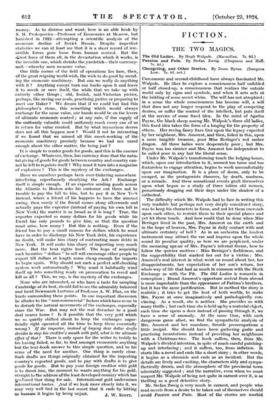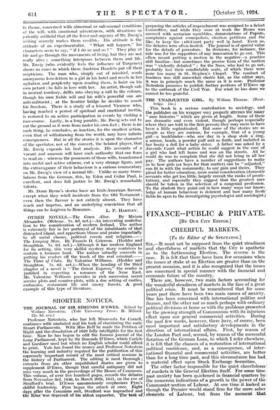FICTION.
THE TWO MAGICS.
Changeling, and Other Stories. By Donn Byrne. (Sampson Low. 7s. 6d. net.) CHILDHOOD and second-childhood have always fascinated Mr. Walpole. He likes to explore a consciousness half unfolded or half closed-up, a consciousness that realizes the outside world only by signs and symbols, and when it acts acts at the bidding of some secret whim. The will has not atrophied ; in a sense the whole consciousness has become will, a will that does not any longer respond to the play of competing desires, or suffer the control of the intellect, but puts itself at the service of some fixed idea. In the mind of Agatha Payne, the black sheep among Mr. Walpole's three old ladies, this fixed idea takes the form of a longing for the property of others. Her roving fancy fixes first upon the legacy expected by her neighbour, Mrs. Amorest, and then, foiled in this, upon a more tangible treasure, poor Miss Beringer's red amber dragon. All three ladies were desperately poor ; but Mrs. Payne was too sinister and Mrs. Amorest too independent to be called poor in any but the literal sense.
Under Mr. Walpole's transforming touch the lodging-house, which, upon our introduction to it, seemed too tame and too featureless to engage attention, begins to work uncomfortably upon our imagination. It is a place of doom, only to be escaped, as the protagonists discover, by death, madness, or a miracle. And these sensational events graft themselves upon what began as a study of three infirm old women, penuriously dragging out their days under the shadow of a cathedral.
The difficulty which Mr. Walpole had to face in writing this very readable but perhaps not very deeply considered story, was to keep his characters in focus, and not let them encroach upon each other, to restrict them to their special planes and yet let them touch. And how could that be done when Miss Beringer lived in the past, Mrs. Amorest on the earth and in the hope of heaven, Mrs. Payne in daily contact with and ultimate certainty of hell ? As in an orchestra the loudest instrument may attract the ear and impress upon the whole sound its peculiar quality, so here we are perplexed, under the menacing uproar of Mrs. Payne's infernal theme, how to follow the quieter motives : Miss Beringer's feebleness, and the suggestibility that marked her out for a victim ; Mrs. Amorest's real interest in what went on round about her, her disappointments, her expectation of her son's return, her whole way of life that had as much in common with the Stock Exchange as with the Pit. The Old Ladies is romantic in conception ; Brand Amorest's opportune arrival from abroad is more improbable than the appearance of Fatima's brothers, but it has the same justification. But in method the story is realistic ; it tries to get the best of both worlds, to , make Mrs. Payne at once imaginatively and pathologically con- vincing. As a result, she is neither. She provides us with many thrills ; but each time she is held up by a material object, each time she opens a door instead of passing through it, we have a sense of anomaly. ' At the same time, with such dangerous game afoot, we find the sympathetic analysis of Mrs. Amorest and her mundane, fireside preoccupations a little insipid. She should have been gathering garlic and practising incantations instead of providing her neighbours with a Christmas-tree. The book suffers, then, from Mr. Walpole's divided intention, in spite of much careful patching- up and interlacing ; and it suffers, too, from inflation. It starts like a novel and ends like a short story ; in other words, it begins as a chronicle and ends as an incident. But the details are lively and exciting, the characters ably and sympa- thetically drawn, and the atmosphere of the provincial town admirably suggested ; and the narrative, even when we must suspect Mr. Walpole of being not quite in earnest over it, is as thrilling as a good detective story.
Mr. Stefan Zweig is very much in earnest, and people who read novels from a desire to be taken out of themselves should avoid Passion and Pain. Most of the stories are morbid in theme, concerned with abnormal or sub-normal conditions of the will, with emotional adventurers, with Situations so patently artificial that all the fever and urgency of Mr. Zweig's writing scarcely makes them credible. His attitude is the attitude of an experimentalist. " What will happen," his characters seem to say, "if I do so and so ? " They play at life and go through the movements of living, but they are not really alive ; something interposes between them and life. Mr. Zweig (who evidently feels the influence of 'Turgenev) shows us cases in which these Austrian Hamlets put off their scepticism. The man who, simply out of mischief, sends anonymous love-letters to a girl in his hotel and revels in her agitation and perplexity -upon reading them, is hoist on his own petard : he falls in love with her. An artist, though safe in neutral territory, drifts into obeying a call to the colours, though his own feeble will and his wife's powerful one are anti-militarist ; at the frontier bridge he decides to assert his freedom. There is a study of a leisured 'Viennese who, having reached a period of spiritual and emotional inertia, is restored to an active participation in events by visiting a race-course. Lastly, in a -long parable, Mr. Zweig sets out to cut the ground as it were from under his own feet ; there is no such thing, he concludes, as inaction, for the smallest action, even that of withdrawing from the world, may have infinite consequences. But in all the stories it is upon the character of the spectator, not of the convert, the belated player, that Mr. Zweig expends his best analysis. His accounts of a vacant and anaemic will have such authority that one fears to read on ; whereas the possessors of those wills, transformed into useful and active citizens, cut a very strange figure, and the extravagance of their behaviour is a curious commentary on Mr. Zweig's view of a normal life. Unlike so many trans- lations from the German, this, by Eden and Cedar Paul, is excellent, and does full justice to Mr. Zweig's remarkable talents.
Mr. Donn Byrne's stories have an Irish-American flavour, except when they retell incidents from the Old Testament ; even then the flavour is not entirely absent. They have reach and impetus, and an underlying-conviction that all
things can be forgiven to Romance. L. P. HARTLEY.



























































 Previous page
Previous page